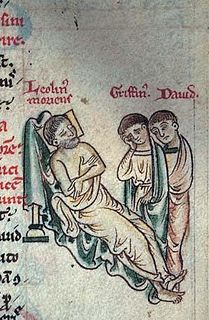Related Research Articles

Llywelyn the Great, full name Llywelyn ap Iorwerth, was a King of Gwynedd in north Wales and eventually ruler of all Wales. By a combination of war and diplomacy he dominated Wales for 45 years.

The Kingdom of Powys was a Welsh successor state, petty kingdom and principality that emerged during the Middle Ages following the end of Roman rule in Britain. It very roughly covered the top two thirds of the modern county of Powys and part of today's English West Midlands. More precisely, and based on the Romano-British tribal lands of the Ordovices in the west and the Cornovii in the east, its boundaries originally extended from the Cambrian Mountains in the west to include the modern West Midlands region of England in the east. The fertile river valleys of the Severn and Tern are found here, and this region is referred to in later Welsh literature as "the Paradise of Powys".
Hywel ab Owain Gwynedd, Wales Prince of Gwynedd in 1170, was a Welsh poet and military leader. Hywel was the son of Owain Gwynedd, prince of Gwynedd, and an Irishwoman named Pyfog. In recognition of this, he was also known as Hywel ap Gwyddeles. Hywel was also known as the Poet Prince for his bardic skills.
Cynddelw Brydydd Mawr, was the court poet of Madog ap Maredudd, Owain Gwynedd, and Dafydd ab Owain Gwynedd, and one of the most prominent Welsh poets of the 12th century.
Llywelyn is a name of Welsh origin, with many spelling variations.
Y Mab Darogan is a messianic figure of Welsh legend, destined to force the English out of Britain and reclaim it for its Celtic inhabitants. A number of figures have been called Y Mab Darogan in history ). An extensive corpus of medieval Welsh prophetic verse, beginning with Armes Prydain, is centred on the figure of Y Mab Darogan.
Dafydd Penmachno Goch or Dafydd ap Dafydd ap Gruffudd is said in some genealogical sources to be the illegitimate and only surviving son of Dafydd III the last free Welsh Prince of Wales.
Owain ap Llywelyn ab y Moel was a Welsh language poet from Powys.
Elidir Sais was a Medieval Welsh language court poet from Anglesey His sobriquet Sais ("English") suggests he was conversant in the English language, something so unusual at the time that it earned him his nickname. It may indicate he had been forced to spend some year in exile in England.
The Welsh court poet Einion ap Gwalchmai was the son of the poet Gwalchmai ap Meilyr and brother of the poet Meilyr ap Gwalchmai. He lived in Gwynedd. Some lines of a praise poem to Llywelyn ab Iorwerth, Prince of Gwynedd, have survived, together with three impressive religious awdlau (odes).
Llywelyn Goch ap Meurig Hen was a Welsh language court poet from Merionethshire, in the north west of Wales.
Iorwerth Beli was a poet who wrote in the Middle Welsh language. Very little is known of his life.
Llywarch ap Llywelyn was a medieval Welsh poet. He is also known by his bardic name, "Prydydd y Moch".
Llywarch Llaety was a Welsh-language court poet.
Gwilym Rhyfel was a Welsh-language poet and warrior.
Iorwerth is a Welsh name, composed of two elements: iôr meaning "lord" and berth meaning "fair" or "handsome". The name has historically been associated with the name Edward, although the names do not have a common origin and neither name is a translation of the other.
Cynfyn ap Gwerystan — sometimes spelled Kynvyn, Kynwyn, Cynvyn, or Kynfyn — was a Welsh nobleman, principally known on account of his son Bleddyn ap Cynfyn, who established the House of Mathrafal over Powys as a consequence of a Saxon invasion in 1063.
Seisyll or Seisyllt is a Welsh male given name. It may refer to:
References
- The Hendregadredd manuscript.
- Morfydd E. Owen (ed.), 'Gwaith Seisyll Bryffwrch', in, Kathleen Anne Bramley et al. (ed.), Gwaith Llywelyn Fardd I ac eraill o Feirdd y Ddeuddegfed Ganrif (Gwasg Prifysgol Cymru, Cardiff, 1994). The standard edition of the poet's work (in Welsh).
| This article about a Welsh poet is a stub. You can help Wikipedia by expanding it. |